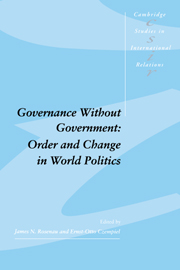Book contents
- Frontmatter
- Contents
- Notes on contributors
- Preface
- 1 Governance, order, and change in world politics
- 2 Governance without government: polyarchy in nineteenth-century European international politics
- 3 The decaying pillars of the Westphalian temple: implications for international order and governance
- 4 The “triumph” of neoclassical economics in the developing world: policy convergence and bases of governance in the international economic order
- 5 Towards a post-hegemonic conceptualization of v/orld order: reflections on the relevancy of Ibn Khaldun
- 6 The effectiveness of international institutions: hard cases and critical variables
- 7 Explaining the regulation of transnational practices: a state-building approach
- 8 “And still it moves!” State interests and social forces in the European Community
- 9 Governance and democratization
- 10 Citizenship in a changing global order
- Index
6 - The effectiveness of international institutions: hard cases and critical variables
Published online by Cambridge University Press: 13 October 2009
- Frontmatter
- Contents
- Notes on contributors
- Preface
- 1 Governance, order, and change in world politics
- 2 Governance without government: polyarchy in nineteenth-century European international politics
- 3 The decaying pillars of the Westphalian temple: implications for international order and governance
- 4 The “triumph” of neoclassical economics in the developing world: policy convergence and bases of governance in the international economic order
- 5 Towards a post-hegemonic conceptualization of v/orld order: reflections on the relevancy of Ibn Khaldun
- 6 The effectiveness of international institutions: hard cases and critical variables
- 7 Explaining the regulation of transnational practices: a state-building approach
- 8 “And still it moves!” State interests and social forces in the European Community
- 9 Governance and democratization
- 10 Citizenship in a changing global order
- Index
Summary
Should we invest scarce resources on a continuing basis in studies of international institutions or, to use a currently fashionable phrase, international regimes? Or will the recent revival of interest in the role of institutional arrangements in international society prove to be no more than a passing fad, interesting as a response to current events but soon to be forgotten by students of international relations in their relentless search for new ideas?
The answers to these questions must surely flow from the conclusions we reach about the role of social institutions in shaping the behavior of individual members of international society as well as collective behavior flowing from interactive processes at the international level. If, as I and many other students of international institutions believe, institutions are driving forces in the sense that it is possible to explain or predict a sizable proportion of the variance in individual and collective behavior in terms of the operation of institutional arrangements, the study of such arrangements will acquire a prominent and lasting place on the agenda of international relations as a field of study. It will not matter much whether analysts choose to treat institutions as independent variables or as intervening variables. In either case, we will find ourselves thinking long and hard about international institutions in a continuing effort to formulate and test a set of (hopefully cumulative) generalizations spelling out the nature of the links between institutional arrangements on the one hand and individual and collective behavior on the other.
- Type
- Chapter
- Information
- Governance without GovernmentOrder and Change in World Politics, pp. 160 - 194Publisher: Cambridge University PressPrint publication year: 1992
- 55
- Cited by

